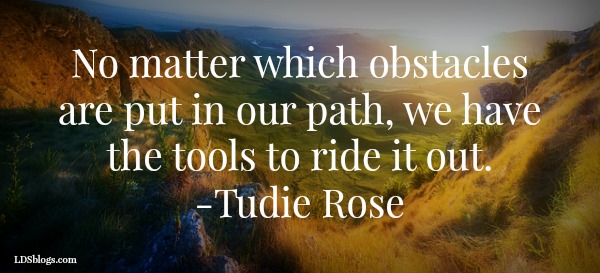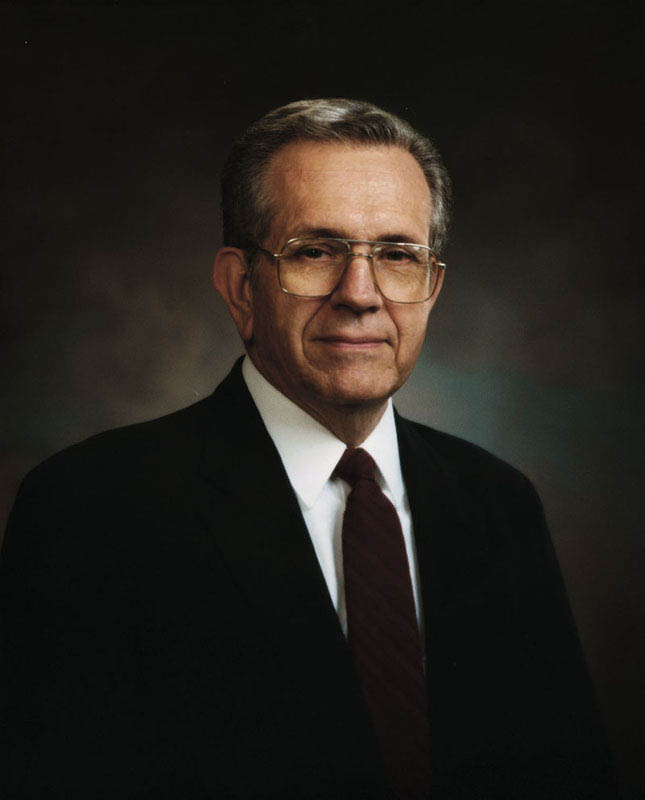Writing a novel is like driving a car at night. You can only see as far as your headlights, but you can make the whole trip that way. —E. L. Doctorow
Let’s pretend that the “novel” is your life. When you get up in the morning, you have a pretty good idea what your day is going to look like. There are always a few surprises, but we usually know whether it is a work day or a weekend, school day or holiday, and whether we have a doctor’s appointment or a soccer game, right? Our “headlights” can extend throughout the week, the month, or even the year to some extent. There are variables and things we don’t know, but we have a basic idea of what is to come for the short term.
Just as we know when we get in the car that we’re going to end up at the grocery store, we also know the end of our life’s novel—our destination. If we have faith, we know that we have a Heavenly Home with Heavenly Parents waiting to greet us. We are anxious to meet up with family and friends whose earthly novels have already been completed. We long for the day when our earthly trials dissolve and the ailments of our bodies are restored to perfection.
 There are things in our earthly story that we can’t see. Though we know there will be obstacles in our path, we don’t know the substance of those obstacles. Have you ever driven your car in the woods at night and suddenly there is a deer in your headlights? It is a terrifying experience. Instincts tell you that you don’t want to hurt or kill the deer, but the reality is that hitting a deer is like hitting a brick wall. You and your passengers are at risk for injury or death. In the story of your life, there are unseen obstacles that can change things in an instant.
There are things in our earthly story that we can’t see. Though we know there will be obstacles in our path, we don’t know the substance of those obstacles. Have you ever driven your car in the woods at night and suddenly there is a deer in your headlights? It is a terrifying experience. Instincts tell you that you don’t want to hurt or kill the deer, but the reality is that hitting a deer is like hitting a brick wall. You and your passengers are at risk for injury or death. In the story of your life, there are unseen obstacles that can change things in an instant.
We don’t know what our personal obstacles will be until they happen. We may lose a spouse, or a child. We may plan for children only to find out we are infertile. We may have an accident and end up in a wheelchair. We may have a sick child. Our children may use drugs or commit crimes. Maybe we’ll end up raising our grandchildren. Maybe our business will fail, or we’ll lose our employment. All of these things are beyond the distance we can see in the headlights.
No matter which obstacles are put in our path, we have the tools to ride it out. Our headlights let us see just far enough down the road to help us drive a bit farther down the road. We can choose to pull off to the side of the road and stop the engine, but that ends the road trip. We can try to avoid the obstacles by going off road, but ultimately, we will get stuck in a ditch and spin our wheels. Moving forward ever so slowly taking care to remove and resolve any obstacles in the headlights will eventually lead us to our final destination.
So many things beat upon us in a lifetime that simply enduring may seem almost beyond us. That’s what the words in the scripture “Ye must … endure to the end” (2 Nephi 31:20) seemed to mean to me when I first read them. It sounded grim, like sitting still and holding on to the arms of the chair while someone pulled out my tooth.
But the test a loving God has set before us is not to see if we can endure difficulty. It is to see if we can endure it well. We pass the test by showing that we remembered Him and the commandments He gave us. And to endure well is to keep those commandments whatever the opposition, whatever the temptation, and whatever the tumult around us. We have that clear understanding because the restored gospel makes the plan of happiness so plain (Henry B. Eyring, “In the Strength of the Lord”, Apr. 2004 General Conference).
Each one of us has our own individualized test. There is no standard test for all. We each walk our own path with our own specialized obstacles according to our individualized need for growth. We have been given the tools to maneuver through our own adversity; we just need to use those tools, beginning with prayer.
The basic requirements for enduring to the end include knowing who we are, children of God with a desire to return to His presence after mortality; understanding the purpose of life, to endure to the end and obtain eternal life; and living obediently with a desire and a determination to endure all things, having eternal vision. Eternal vision allows us to overcome opposition in our temporal state and, ultimately, achieve the promised rewards and blessings of eternal life.
If we are patient in our afflictions, endure them well, and wait upon the Lord to learn the lessons of mortality, the Lord will be with us to strengthen us unto the end of our days (Robert D. Hales, “Behold, We Count Them Happy Which Endure”, Apr. 1998 General Conference).
I’m not by nature a patient person, so enduring well has been a struggle for me. I am learning, however. I am committed to waiting upon the Lord to learn the lessons of mortality. As I continue to try, I do feel the strength of the Lord with me. I may not be able to see past the headlights, but I know with His strength, I can endure to the end of my novel.
About Tudie Rose
Tudie Rose is a mother of four and grandmother of ten in Sacramento, California. You can find her on Twitter as @TudieRose. She blogs as Tudie Rose at http://potrackrose.wordpress.com. She has written articles for Familius. You will find a Tudie Rose essay in Lessons from My Parents, Michele Robbins, Familius 2013, at http://www.familius.com/lessons-from-my-parents.
Twitter •







